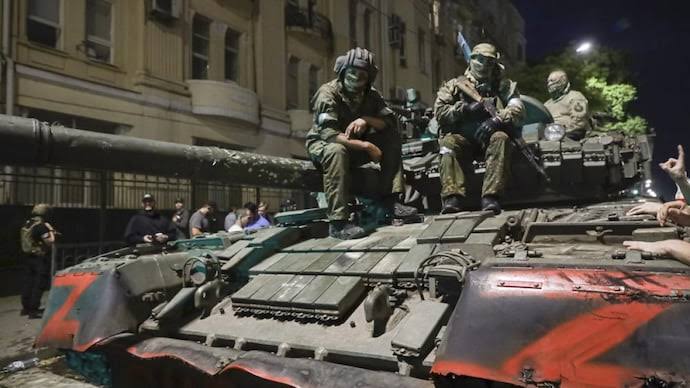The failed Mutiny of the mercenaries in Russia

Countries around the world were shocked at events which unfolded in Russia on Saturday, where a mutiny by the ‘Wagner Private Military Company’ founded by Evgeni Prigozhin (a one-time close friend of Russian president Vladimir Putin and the “ Chairman “ of a para-military group) attempted to stagnating against the Russian Military.
Prigozhin is quoted by US and Western media outlets regarding the apparently stalled Russian offensive to capture Kiev and alleged weaknesses of the Russian military establishment.
The Wagner group – set up in 2014, has been involved in the conflict in Ukraine since the initial Russian move to liberate the Donbas the Russian speaking region of Ukraine. Its activities have also spread to include mercenary operations in Africa.
According to ‘The Telegraph’, in January, the British Ministry of Defence estimated that its (Wagner’s) total strength had peaked at around 50,000 fighters. Prigozhin however claimed his army comprises 25,000 men. It was this small force which on Saturday attempted a coup and captured Rostov, a major military post in Russia.
By Sunday morning however, Prigozhin folded up and accepted to go into exile in Belarus. He also ordered his mercenaries to stop their so-called “ advance on Moscow” . The group has begun to leave the southern city of Rostov-on-Don where their mutiny began and ended in a whimper . According to reports, his troops will not be prosecuted as part of an agreement.
While the mutiny ended as suddenly as it began, it has not dented the Russian Govt. The question which arises is what turned a close Putin-aide into a belligerent foe?
The US and Western bloc countries often refer to the need to protect what they refer to as a (Western ) rules-based international order (RBIO). This system based on political, economic and liberal thoughts of the WEST, with the US dollar as the benchmark currency, was established in the aftermath of World War II and was led by the US.
The RBIO is credited with expanding free trade, increasing capital mobility, spreading democracy, promoting human rights. The West initially saw the system as its defence from the then Soviet Union and China which followed a politically different ideology based on Marxism.
The RBIO has since been used as a tool to preserve the status quo of Western dominance over newly independent colonies, as well as of the global economy.
China’s emergence as a leading global economic power and its rising military clout roused alarm bells in the West. The fallout saw the West blocking the use of Chinese goods and digital technologies in their countries.
The US also provokes China through backing Taiwan’s independent movements and challenging Chinese maritime rights via sailing through the Straits of Taiwan claiming ‘freedom of navigation’.
At the same time, the Western bloc’s confrontation with Russia, created conditions which ultimately led to the Russian invasion of Ukraine. In ‘retaliation’ Russia has faced sanctions from the US and EU.
It has been removed from international financial messaging system ‘Swift’ delaying payments for its exports of oil and gas. It has also seen its assets seized by the West for its invasion of Ukraine.
But the measures backfired. Major economies like India, Saudi Arabia and China continue purchasing Russian oil and gas. Rather than use the dollar; payments are made in own currencies – Ruble, Yuan
and INR.
The organization BRICS (comprising Brazil, Russia, India, China, and South Africa) is set to build a joint financial infrastructure that will enable a reserve currency to be created. Saudi Arabia, and a number of countries in West Asia are set to join the BRICS group adding further stability to the new BRICS reserve currency.
It brings to mind another coup – the coup which toppled Libyan leader Colonel Muammar al-Ghaddafi. Ghaddafi was attempting to establish a pan-African currency based on the Libyan Golden Dinar.
Libya held 143 tons of gold, and a similar volume in silver. The gold was intended to establish a pan-African currency based on the Libyan Golden Dinar. The plan was designed to provide Francophone Africa with an alternative to the CFA (CFA franc is characterized as a credible and stable currency).
The US, Britain and France were directly involved in the assassination of Colonel Ghaddafi and overthrowing his regime. Since his assassination, Libya has been splintered and is now a failed state.
Had the coup in Russian succeeded, a similar fate would have awaited the Russian people.
Source : Daily Mirror



